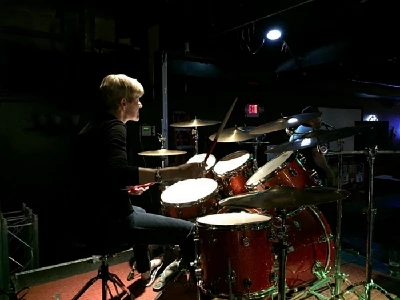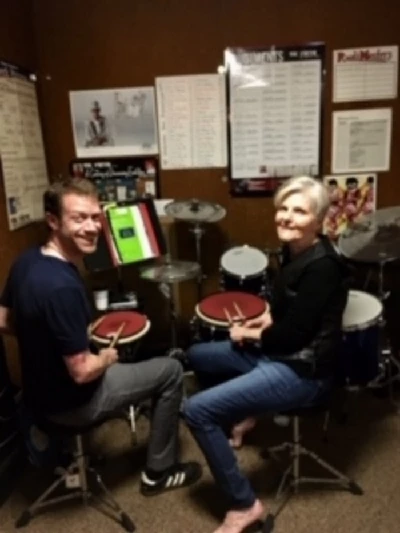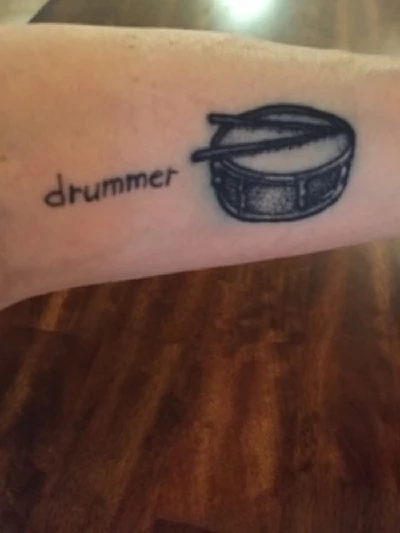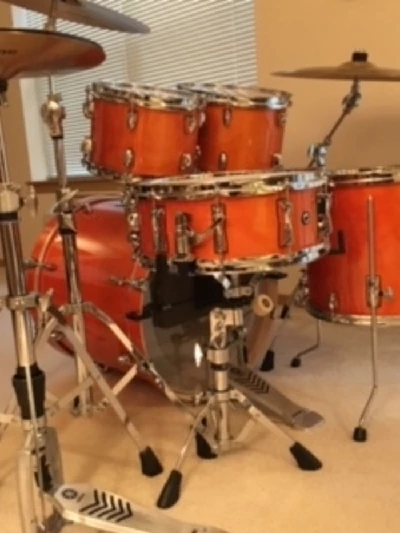published: 14 /
6 /
2019

Oregon drummer Adele Koltun's youthful enthusiasm for playing live is contagious, even though she learned the instrument later in life. 'Crash' Koltun talks to Lisa Torem about overcoming fear and finding passion, whatever one's age.
Article
Over the course of ten years as a Pennyblackmusic writer, I’ve had the opportunity to interview many of my rock heroes. Many have played to huge crowds in historical arenas, dined with prominent statesmen and acquired impressive awards. Yet, they’ll often confide that they pine for the early days, when they bubbled over with excitement at the thought of mastering a new chord on their given instrument or watched in astonishment as strangers gathered near the front of the stage, anxious to soak up every beat.
A few weeks ago, I met a musician who exemplifies that enthusiasm. She’s not exactly famous and unless you frequent dive bars in Oregon, you may have never seen her in action but she is as effervescent as the old-school lighters or cell phones that flicker at an outdoor festival, held by fans, hoping to coax an artist back out for an encore.
Adele came to music later in life. Currently, she is neither a member of a rock band or a session musician. That’s not to say that won’t happen but the beauty is, that regardless of what transpires in the future, she appears to be genuinely intrigued by the journey and the prospect of learning everything she possibly can, whatever the odds.
We've read all too often about child prodigies that eventually burn out and artists that commercially sell out but much less about older, intrepid musicians, who wake up each day, anxious to pursue their passions.
That said, Pennyblackmusic welcomes drummer Adele “Crash” Koltun.
PB: You started taking drum lessons later in life. What attracted you to this instrument and what made you “bite the bullet” and commit to drum lessons during this point in your life?
AK: What led me to take drum lessons was, during a walk when I heard the song, 'Those Shoes' by the Eagles, I thought, “I’d love to play the drums to that song". Then sanity hit and the voice in my head said, “That’s crazy, you’re way too old". But after two weeks of listening to the song and still wanting to play the drums to it, I thought, “What do I have to lose by playing that song"? I called a drum teacher and made an appointment. I told no-one that I was taking drum lessons. My plan was to just learn that one song. That decision changed my life… I found my passion.
PB: What kinds of skills did you acquire during the first year of lessons? At what point did you feel you were able to synchronize the hand-eye coordinates? Are there certain rudiments that every beginning student should master?
AK: During the first year, I learned to read notes and play basic beats. It was a smooth progression from one drum and one cymbal to the whole set. In my case, I fell in love with the drums after the first month. I think people are intimidated by drums because the drummer plays with both hands and both feet independently. Drum lessons are designed to incrementally add eye-hand and limb coordination. I had never sat behind a drum set before I started lessons in 2012 and if I can do it, anyone can.
PB: What are some of the greatest joys and challenges you have experienced as an adult student?
AK: A great joy was the first night I went on stage, it was also the first time I played with a band. The biggest challenge for me was the fear of going on stage but when I sat behind the drums and the music started and I began to play, it was pure ecstasy. I knew I had found my purpose. Seven years later, playing the drums is my greatest joy. I had many supportive musicians who constantly encouraged me to play. I learned that, when trying something new, fear is part of the process of reaching the goal. So feel the fear and do it anyway.
PB: Any favorite rock drummers?
AK: My favorite drummer is my teacher, Mark Powers. I loved how he played before I met him. I heard one of his students play and knew I wanted to play like that. The drumming was unique and fresh like nothing I’d heard before. Unfortunately, Mark had left the area and was not expected to return. Two years later, I needed a teacher. I contacted a music store and was referred to Mark Powers. This was beyond my wildest dreams! His talent inspires me as a drummer because he is the epitome of excellence with his playing. He is passionate about learning and perfecting his craft in all areas of percussion and genres of music. Mark not only uses books for lessons but writes them on blank music sheets for each student-he tailors his lessons for the students. He is so kind and thoughtful and I’m sure each student thinks he/she is his favorite.
When I discuss local bands or individual musicians with Mark, he has never said an unkind word, he is the only musician I know who has that much integrity. Every time I watch him play, I see or hear something new. In addition to those qualities, he has done three TED Talks and hosted two TEDx programs, written adult and children’s books for and about drumming and has taught percussion in all school levels in several states. He has also studied percussion in China, Thailand, Puerto Rico, Cuba, Ghana and Uganda. That’s an abbreviated list of his accomplishments that I got on Google because he never talks about himself. Incredibly talented, humble, kind and generous, a man of integrity. That’s Mark Powers.
PB: What is it like playing live? Are you more comfortable playing for a group of strangers or friends?
AK: For me, playing music with others is magic. I often can’t believe I’m sitting on stage watching people dancing or tapping their feet to the beat I’m playing. I prefer playing for strangers, because to them I am just the drummer, not a personality and I can let go and relax into the music.
PB: Having played a number of years now, you have been warmly accepted into a community of working Oregon musicians. What has this meant to you? If you could speak directly to these musicians, what would you say?
AK: I went to hear live music frequently before starting lessons, so I got to know the local musicians. They knew I was taking lessons and that I was on fire about drumming. They all supported and encouraged me from the beginning. After six months of lessons, they invited me on stage. At jams, someone would ask how many drummers were in the place. They always included me in the drummer count. When I began playing on stage, I would get hugs and praises from all the musicians and many people in the audience. I could not have achieved my dream without them. I have expressed my love and gratitude to these wonderful people every time I see them. They accepted me unconditionally and made my dream come true. I’m incredibly blessed.
PB: Many adults would probably enjoy learning new instruments but lack the confidence or drive. Do you have any encouraging words for them?
AK: If I hadn’t tried to play the drums, I would have never found my passion. Before I started lessons, I’d never given drumming a second thought and then I heard a song that made me want to play the drums. I learned a lesson from that experience: Trust what attracts your attention…even if you don’t think you can do it. If you love music, then learning to play an instrument will open up a whole new world for you. Taking one lesson is not a lifelong commitment but it can change your life.
PB: Can you describe your current set of drums and tell us if they hold a special meaning for you? If you decide to upgrade, will you keep them around? Do they have a name?
AK: My original drum set was Yamaha Stage Custom Birch. When I got my drums, I wanted to sleep on the floor next to them because I couldn’t believe they were mine. A few years later, I was the host drummer for two small jams and had to bring my drums to venues. I decided to get a smaller set that would be more portable. I sold my set (which I loved) and got a smaller Yamaha Stage Custom Birch set. My drums are in my living room and they are my life. Just seeing them brightens my day. No name thus far for the drums.
PB: Does drumming require physical and mental strength?
AK: With months of practice, your body stores muscle memory so when you hear s song you intuit the right beat. It’s embedded in your consciousness. Drumming doesn’t require a lot of strength except for extreme genres like heavy metal. It’s the wrists that do most of the work and you learn how to optimize the bounce of the sticks to play fast. It looks like so much fun because it is!
PB: As a performer, do you go by any other names?
AK: I’ve never gotten a nickname from my musician friends. A few people call me “BDG” — Barefoot Drummer Girl because I drum barefoot. I do that because the foot pedals for the bass drum and high hat cymbals are metal and slippery. I tried everything: socks, thin-soled shoes and nothing worked. I also go by the name “Crash".
PB: Tell us about your tattoos. What do they signify?
AK: I got my first tattoo in 2017. It is on the inside of my lower, left arm and says, “drummer” in small, lower-case letters. I liked it so much that a few months later I added a tiny, music note on the inside of my left wrist because it was music that led me to drumming. People kept suggesting that I needed a drum next to “drummer” and so a year later I put a replica of my snare next to the word. I got the tattoos for me, to acknowledge that this is truly who I am. Every time I see them, I smile.
PB: Thank you.
Band Links:-
https://www.facebook.com/adele.koltun
Play in YouTube:-
Picture Gallery:-


